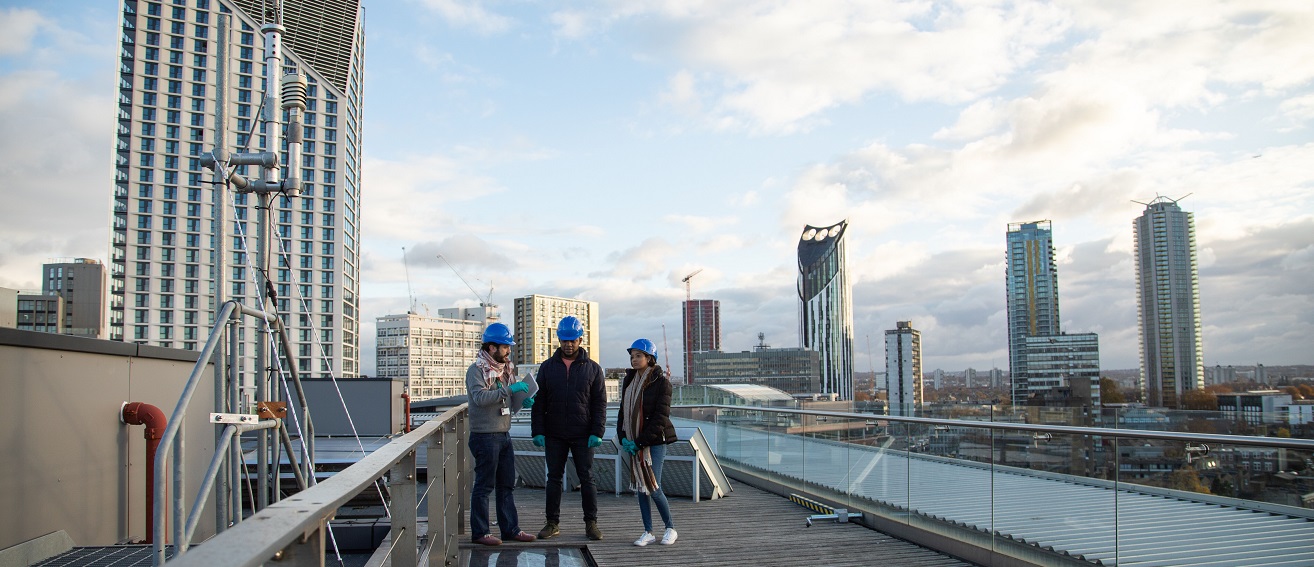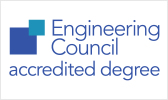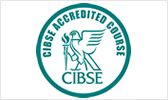Search our site...
Search module
Overview
70 years of expertise
The Building Services Design Engineering Apprenticeship includes a degree qualification in Building Services Engineering BEng (Hons) and a qualification leading towards Incorporated Engineer status.
Did you know that more than half the graduates working in the building services engineering field in the UK have been educated at LSBU? With more than 70 years of expertise, our course will equip you with the technical and managerial know-how to be an effective leader in this specialist sector.
Building services engineering covers the design, installation, operation and maintenance of all the things that make a building safe, comfortable, energy efficient and functional. It’s always in demand and set to grow as buildings’ designs evolve to become more sustainable.
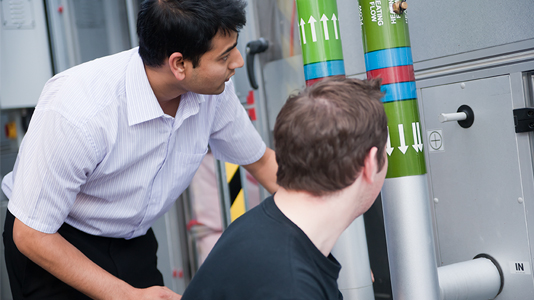 |  |  |
 | 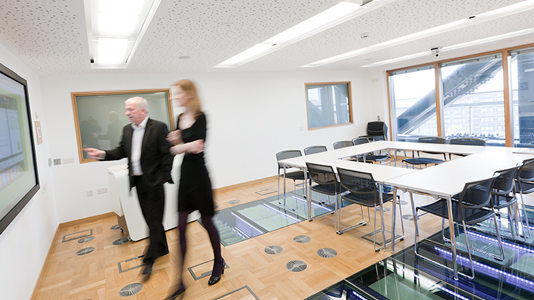 |  |
The full apprenticeship standard and assessment plan can be found on the IfA website.
Apprenticeship Employment Guidelines
Apprenticeship Evidence Pack Guidance
Why study Building Services Engineering at LSBU?
- graduation-cap
- 1st for graduate prospects amongst London competitors in Building (Sunday Times 2019).
- star
- Awarded with the Mayor's Construction Academy (MCA) quality mark, which recognises high-quality construction skills training provision in London.
- university
- Heritage: we have been running courses for the building services engineering industry since 1947
- check-circle
- Professional accreditation: accredited by the Chartered Institute of Building Services Engineers (CIBSE) and the Energy Institute (EI) as meeting the academic requirements of Incorporated Engineer status as per the Engineering Council.
- space-shuttle
- We have one of the best laboratory–workshop complexes in London.
- heartbeat
- Ranked 2nd amongst London competitors for overall satisfaction in Building courses (National Student Survey 2018).
| ModeApprenticeship | Duration4.5 Years + EPA (1 year) | Start dateSeptember | Application code5124 | Application method Direct to LSBU |
Location
London South Bank University student union is located at 103 Borough Rd, London SE1 0AA.
If you are visiting our Southwark Campus, you may wish to use our downloadable campus map (PNG File 466 KB). For information on accessibility, see our DisabledGo access guides. See our location page for more details.
Entry Level Requirements
- A Level BBC - Must include Mathematics and preferably a Science in either Chemistry or Physics (UCAS points: 112)
- T-level (Merit or above) in Construction: Design, Surveying And Planning. (UCAS points: 120)
- BTEC Level 3 Extended Diploma DDM in an Engineering subject area, with a minimum of merit in Mathematics and Further Mathematics. (UCAS
- points: 128)
- BTEC Level 3 National Diploma D*D* in an Engineering subject area, with a minimum of merit in Mathematics and Further Mathematics. (UCAS points: 112)
- Building Services Engineering Technician level 3 apprenticeship DD (UCAS points: 96) alongside grade Pass or Distinction at EPA, please get in contact with the LSBU Apprenticeships at apprenticeships@lsbu.ac.uk for Apprenticeships Routes
- If you have any of the above qualifications but don't meet the criteria, or any other technical qualifications awarded with UCAS points at a similar level, please get in contact with the LSBU Apprenticeships at apprenticeships@lsbu.ac.uk for Apprenticeships Routes
- Applicants must hold 5 GCSEs A-C including Maths and English or equivalent (reformed GCSEs grade 4 or above)
Choose your country
Select country here:
Missing English and Maths qualifications?
If you do not have the required English and Maths qualifications needed to satisfy the entry requirements for this programme, we have courses available at our partner College that you can take to upskill in these areas. Find out more at South Bank College.
Funding
The cost of the apprenticeship is paid fully by the employer (sometimes part funded by the government) through apprenticeship levy. The apprenticeship levy is a pot of money some companies pay into, which all businesses have access to spend on the training costs of apprenticeships. Companies fall into two categories: levy-payers (who pay into the pot) and non-levy payers (who do not). You can find out more in our Levy and Funding section, specifically for employers
The apprentice does not contribute toward the cost of study.
Bands
Apprenticeship standards are all assigned a funding band by the Government – these funding bands are the maximum amount the Government will fund via the levy towards a given apprenticeship standard. There are currently 30 funding bands ranging from £1,000 to £27,000.
Incentives
Employers with less than 50 staff sending an apprentice aged 16-18 will have 100% of the training costs paid by the government. All employers who employ an apprentice aged 16-18 on the first day of teaching will receive a £1,000 incentive from the government. You can find out more in our Levy and Funding section, specifically for employers.
Cost
You can find out the funding band for an Apprenticeship Standard on the Government website. To find out how much we are charging, please get in touch with us at apprenticeships@lsbu.ac.uk
Field trips
Some modules include field with and site visits, which may be residential or outside the United Kingdom, ranging from three to five days. These are organised by the Division and students are required to contribute towards the cost. If there are any field trips or any course visits as part of your course, we will let you know in good time.
Home
| Mode Apprenticeship | Duration 4.5 Years + EPA (1 year) | Start date September | Application code 5124 | Application method Direct to LSBU |
An Apprenticeship Standard is comprised of a programme of study, an End Point Assessment and on-the-job learning. This means that in addition to meeting academic requirements, you’ll need to be employed in a role related to your apprenticeship. The process of applying depends on whether you have an employer to sponsor (and support) you.
If you are employed and your employer has confirmed they will support your apprenticeship:
You are welcome to submit an application via our application system. You’ll need to provide details of your employment/employer as part of the application. You’ll also need to ensure you and your employer meet the requirements – find out who can be an apprentice to see if you meet the entry requirements and employer commitments to find out more about your employer’s role.
If you are not employed:
- You will need to find a job role related to the apprenticeship you wish to apply for, with an employer who is happy to support you. If you would like to find an employer to support your apprenticeship with LSBU, you can search which employers are currently advertising Apprenticeships via the National Apprenticeship Service website searching for ‘London South Bank University’ as keywords.
- If there are no search results, this means there are currently no vacancies. We update our vacancies regularly, so please do check back regularly.
- Many employers advertise their apprenticeship vacancies on their websites or via other portals. You could search for ‘find an apprenticeship’ online.
- When you’re ready to apply, see the government's advice on how to write a winning apprenticeship application and make your application.
Further information for apprentices
If you’re a prospective apprentice, you can find out more about who can be an apprentice on our student pages.
Further information for employers
If you’re an employer, you can find information about the employer commitments and further related information on the related pages for business.
See our admissions policy 1.0 MB and complaints policy 516.0 KB.
Prepare to start
There are steps the apprentices, the employer and the University need to complete before you start your course. Take a look at the steps to be completed in the Enrolment section. Employers may also like to look at our steps to offering an apprenticeship.
First, we’ll teach you the fundamental scientific principles that support mechanical and electrical building services. Following this, you’ll explore in more depth how to operate and control heating, ventilation and air conditioning. In the final year, we’ll focus on sustainability: the dynamic thermal performance of buildings, energy resources, combined heat and power, wind power generation and lighting and electrical systems.
We set lots of design projects to simulate a working environment and you can expect to use computer modelling techniques to optimise and refine your design proposals, as well as laboratory/workshop experiments.
- Engineering mathematics
This Module will introduce you to the main mathematical techniques which are required in the early stages of engineering degrees. The topics include Revisions of Algebraic operations and functions, complex numbers, trigonometry, calculus, curve sketching, and matrix and vector algebra. Assessment: 50% coursework, 50% exam. - Building services engineering principles
You will be taught the underpinning skills and engineering principles relevant to mechanical and electrical building services engineering and be able to apply this contextually. Assessment method: 100% exam. - Construction practice
This module aims to provide you with the knowledge of the interrelationships between industry, professional bodies and education, and an understanding of key professional and research requirements. It will provide you with a roadmap for your professional career, and will enable you to prepare for employment in the construction discipline. Assessment method: 100% coursework. - Introduction to building services
The module will introduce you to the underpinning concepts, purpose and types of building services. Assessment method: 100% coursework. - Internal environment and comfort
This module is divided into three main parts: the first part will deal with the theory and practical application of acoustics; the second part will analyse the theory and practice of light and lightning theory; and the third part will deal with thermal environment and comfort. Assessment methods: 30% coursework, 70% exam. - Heating and ventilation systems
The module introduces heating and ventilation systems. On heating systems the focus is on LPHW systems covering the operating pressure and temperatures, boilers, system efficiency, heat emitters, and pipe sizing, heating and district eating. On ventilation systems, the ventilation requirements are considered and subsequently the various types of systems ( including natural ventilation) and the component parts of ventilation systems are described and their performance is analysed. Assessment method: 100% coursework. - Advanced engineering mathematics
This module aims to provide you with the knowledge of the interrelationships between industry, professional bodies and education, and an understanding of key professional and research requirements. It will provide you with a roadmap for your professional career, and will enable you to prepare for employment in the construction discipline. Assessment method: 30% coursework, 70% exam. - Thermofluids engineering
This module provides you with a study of heat transfer, fluid mechanics and thermodynamics exploring more theory to allow analysis of processes and extension into computer modelling. It also specifically covers the application of thermofluids to mechanical services used in buildings. It expands and extends the understanding gained in Engineering Principles and will enable you to design, explore and investigate. The fundamentals will be introduced by lectures and demonstrations to provide a basic knowledge of the principles of applied thermodynamics, which will then be extended to the study of systems and design. Assessment method: 100% exam. - Refrigeration, air-conditioning and heat pump engineering
This module covers specific mechanical services used in buildings. It expands and extends the understanding you will have gained in heating and ventilation systems and will enable you to design, explore and investigate refrigeration technology and air conditioning systems and heat pumps. The fundamentals are introduced by lectures and demonstrations to provide a basic knowledge of the principles of applied thermodynamics, which is then extended to the study of systems and design. A major emphasis will be placed on developing a practical ability and on understanding the environmental implications in the use of systems through carefully structured laboratory experiments. Assessment methods: 30% coursework, 70% exam. - Integrated building design
Working in small groups, you'll develop a fully integrated concept design for a building, starting from the briefing and masterplanning stage. Selected elements of the concept design will be developed to a detailed design stage. The work will be carried out within the framework of Level 2 BIM with appropriate information exchanges. Assessment method: 100% coursework. - Project and business management
This module gives an overview of engineering management and covers topics such as financial principles, management of innovation, technology strategy, and project management. The focus of the module is on the development of individual skills and team work. Assessment method: 100% coursework. - Electrical services in buildings
This module is divided into two major parts: the first part will deal with intermediate circuit theory and analysis, while the second part will study electrical installation and services in buildings. Assessment methods: 30% coursework, 70% exam. - Energy management and controls
This module examines the controls and processes that are necessary for efficient and effective operation of buildings and their engineering services. It provides an understanding of control elements and building energy management systems, and the way that information from these systems can be used to manage energy. The module also presents tools for financial analysis and reporting. Assessment methods: 60% coursework, 40% exam. - Passive building design
On completing this module, you'll be able to analyse a building and its world-wide location, and propose novel and effective passive methods to reduce energy consumption and improve occupant comfort. You'll understand the requirements of the wider design team and adapt and communicate your proposals appropriately. Assessment method: 100% coursework. - Major project
This module is a culmination of the course, where the knowledge and skills gained are applied to a specific investigation, either design or research-based. You should be able to analyse the technical performance, environmental impact and economic feasibility of the project. The results should be in a form comparable to industrial standards, based on current guidelines or regulations. Assessment method: 100% coursework.
Plus two modules from either the electrical or mechanical route:
Electrical route
- Electrical power systems and distribution
This module focuses on 11kV high voltage electrical power system and Low-Voltage Distribution and equipment, focussing on their application on electrical building services. Assessment methods: 30% coursework, 70% exam. - Lighting and electrical systems
The module is designed to equip you with up-to-date knowledge and skills to enable you to work in the design, installation, operation and maintenance of lighting and electrical systems in building services industries. Lighting will be covered as far as required to undertake design calculations and appreciate what is assumed in the use of proprietary design software packages. Assessment methods: 30% coursework, 70% exam.
Mechanical route
- Heat and mass transfer applications
This module provides an advanced study of heat and mass transfer, the design of heat transfer equipment, the application of heat transfer within a building envelope and the development of the CIBSE Admittance Method used for the assessment of cooling and heating loads. It also deals with the calculation of cooling loads using commercial software, and the strategies for the reduction of energy used for cooling including thermal mass, natural ventilation, night time cooling, evaporative cooling. Assessment methods: 50% coursework, 50% exam. - Thermal energy systems
In relation to sustainable engineering, you'll develop a deep understanding of the principles that govern building services thermal energy systems and renewable and Low or Zero Carbon technologies. Assessment methods: 50% coursework, 50% exam.
| Year 1 | Year 2 | Year 3 | |||
|---|---|---|---|---|---|
| SEMESTER 1 | SEMESTER 2 | SEMESTER 1 | SEMESTER 2 | SEMESTER 1 | SEMESTER 2 |
| Engineering Mathematics &. Modelling | Advanced Math. & Modelling | Energy Control & Mang. | Innovation & Enterprise | Major Project | |
| Engineering Principles |
Design Applications 5 AND Project Management | Design Analysis | |||
| Design and Practice | Electrical Installation Distribution and Lighting | Option | Energy Resources | ||
| Mechanical Services for Buildings | Thermo-fluids, Air Conditioning & Refrigeration | Options | |||
Careers
Employability Service
By completing the apprenticeship route, you’ll have the advantage of having real-world work experience, working in a role related to your area of study. This will give you a competitive edge among other graduates when you complete your apprenticeship standard.
During your studies – and for two years after you graduate – you’ll have access to our Employability Service, who can help you develop your skills through the Careers Gym workshops and presentations. Our JobShop advisers support students and graduates with finding the right job for them.
We are University of the Year for Graduate Employment - The Times and Sunday Times Good University Guide 2018.
Benefits of the apprenticeship standard route
By studying the apprenticeship route, you gain real world work experience combined with a better understanding and analysis of your daily tasks, building skills and contacts, giving youthe edge on graduation.
Role
A building services design engineer manages a team of engineers and technicians, collaborating with other construction professionals to design the various services found in buildings and infrastructure projects. The work typically includes systems such as renewable and emerging technologies, energy management, heating, ventilation, air conditioning, drainage, lighting, power, water services, building management systems, life-safety systems, communications and building transportation (e.g. lifts). Buildings and infrastructure take on many forms, from newly built facilities to the refurbishment of premises for every sector of industry.
As a building services design engineer, you could be working as a contractor, for a design consultancy, or within a manufacturing company. You’ll provide design solutions aimed at enhancing the quality of environment and community, employing current and emerging technology to undertake the technical and commercial management of projects. As well as this, you’ll ensure that business, client and end user needs are taken into account and work within Ònancial and safety constraints.
Building service engineers help buildings to deliver on their potential. They work with architects and construction engineers to produce buildings that offer the functionality and comfort we expect, with the minimum impact on our environment. They design the lighting appropriate for the space, the heating, cooling, ventilation and all systems that ensure comfort, health and safety in all types of buildings, residential, commercial and industrial.
The on-the-job element of your apprenticeship will give the opportunity to work and network with other professionals in the industry.
We have been running courses for the building services engineering industry since 1947. In that time we’ve built up a lot of industry contacts. Our close links with industry ensure that our course is up-to-date with their needs – and this means our graduates are in demand.
BSEIAB (Building Services Engineering Industrial Advisory Board)
Our partners help our academic staff to maintain a balance between academic requirements and up-to-date industrial practice with regular meetings and visits to their companies.
In-sync with industry
Accreditation is a mark of assurance that the degree meets the standards set by the Engineering Council, who represent the engineering profession. This course is accredited by the Chartered Institution of Building Services Engineers (CIBSE) and the Energy Institute.
Teaching and Assessment
BEng programme
As a BEng programme, this course encourages you to acquire a deeper understanding of the essential concepts, theories and principles of building services engineering and the science and mathematics which underpin it. Many recruiters will look favourably on BEng graduates for this reason.
Apprenticeship structure
The Apprenticeship Standard is comprised of on-the-job learning, as well as both structured and self-directed study.
Duration
The typical duration for this apprenticeship is 66 months: 54 months to complete the degree and another 12 months to move towards the gateway and End Point Assessment (EPAb), but this is dependent on the apprentice’s previous experience.
Delivery
Part time day release: apprentices attend university once a week for two semesters. Semester 1 runs from September to January and Semester 2 from January to June.
Assessment
Assessment of the academic element of this apprenticeship will consist of coursework, exams and timed assessments. There will be formal lectures, study guides, course notes, directed reading, class tutorials, assignments, small group projects, workshops and laboratories.
Note: outside of term-time apprentices must maintain 20% of their time on off-the-job training. The government website provides further information and examples about off the job training can be.
Gateway
Before undertaking the End Point Assessment, you will provide evidence of satisfactory completion of all aspects of the apprenticeship programme: accredited civil engineering degree, employer agreed formal training plan and CPD records; level 2 Maths and English; employer confirmation and request for end point assessment.
End Point Assessment
The End Point Assessment is the final stage of your apprenticeship programme. During the EPA you will demonstrate your acquired competence and skills during your professional career whilst undertaking your degree. This is the reason for the EPA being a professional assessment rather than an academic one.
It is comprised of: a written report (4500 to 5000 words), prior to a presentation and structured interview supported by a written exam (3 questions related to industry knowledge relevant to the apprenticeship standard).
People profiles
Register your interest
Apprentice Guide
Download our guideContact information
Course Enquiries - UK
Tel: 0207 815 7500
